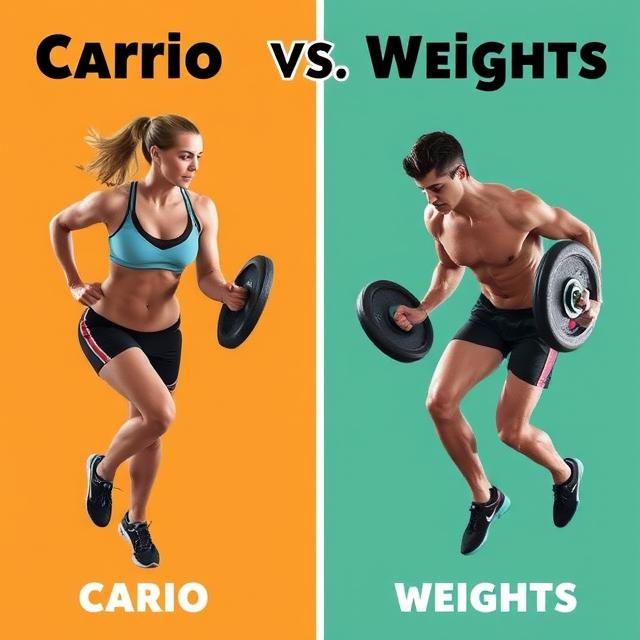Welcome to Top Health Coach, where we explore the best ways to achieve a healthier, fitter version of yourself. If you’re confused about whether to focus on cardio or weights for your fitness journey, you’re not alone. Both cardio and weight training offer incredible benefits, but they target different aspects of your fitness. In this blog, we’ll dive into the benefits of both, helping you decide which is better for your specific goals and lifestyle.
Understanding Cardio: The Heart Health Hero
Cardiovascular exercise, commonly referred to as cardio, involves any activity that increases your heart rate. This includes exercises like running, cycling, swimming, and even brisk walking. Cardio is primarily known for improving heart health, but its benefits extend beyond just the cardiovascular system.
Benefits of Cardio
- Improves Heart Health The most obvious benefit of cardio is its ability to improve cardiovascular health. It strengthens your heart, allowing it to pump blood more efficiently, which lowers your risk for heart disease, hypertension, and stroke.
- Burns Calories and Fat One of the primary reasons people turn to cardio is for fat loss. Cardio exercises are highly effective for burning calories, which leads to fat loss over time. When paired with a balanced diet, cardio can help you shed excess weight and improve overall body composition.
- Boosts Endurance Regular cardio sessions increase your stamina and endurance. This makes everyday activities—like climbing stairs, walking, or carrying groceries—feel easier and less tiring.
- Mental Health Benefits Cardio is a great mood booster. It releases endorphins, which are known as “feel-good” hormones. Regular cardio can help reduce stress, anxiety, and depression, making it a valuable tool for mental health.
- Increases Longevity Studies have shown that engaging in regular cardiovascular exercise can extend your life expectancy by reducing the risk of chronic diseases such as type 2 diabetes, obesity, and certain types of cancer.
Understanding Weights: Building Strength and Muscle
Weight training, also known as resistance training or strength training, involves lifting weights or using resistance bands to work your muscles. This type of exercise can be done using free weights (dumbbells, barbells), machines, or even your own body weight (push-ups, squats, lunges).
Benefits of Weight Training
- Builds Muscle Mass The most significant advantage of weight training is its ability to build muscle mass. Increasing muscle mass improves overall body composition, leading to a leaner, more toned appearance. More muscle means a higher resting metabolic rate, which helps you burn more calories even at rest.
- Strengthens Bones Weight training is one of the best ways to strengthen your bones. It increases bone density, reducing the risk of osteoporosis as you age. This is particularly important for women, who are more prone to bone density loss.
- Improves Strength and Power Regular weightlifting increases muscle strength, which helps you perform everyday tasks with greater ease. From lifting heavy objects to performing functional movements, weight training equips you with the strength needed for daily activities.
- Boosts Metabolism Muscle is metabolically active, meaning it burns more calories at rest than fat tissue. By building more muscle through weight training, you increase your resting metabolic rate, which can help with weight management over time.
- Enhances Posture and Balance Strength training is essential for improving posture and balance. It strengthens the muscles that support your spine, reducing the risk of back pain and injury. It also improves overall stability, which is crucial as we age.
Cardio vs. Weights: Which is Better for Fat Loss?
Both cardio and weights can help you lose weight, but they do so in different ways. Cardio burns a large number of calories during the exercise itself, making it effective for short-term fat burning. For example, a 30-minute jog can burn anywhere from 200 to 400 calories, depending on your intensity and body weight.
On the other hand, weight training may not burn as many calories during the workout, but it has a long-lasting effect. Building muscle increases your resting metabolic rate, meaning you burn more calories throughout the day, even when you’re not exercising. This is called “afterburn” or Excess Post-Exercise Oxygen Consumption (EPOC). The more muscle you have, the more calories you burn at rest.
Cardio vs. Weights: Which is Better for Building Muscle?
When it comes to muscle building, weights are the clear winner. Cardio does little to stimulate muscle growth, although it can help maintain muscle mass when combined with strength training. Resistance exercises, such as squats, deadlifts, and bench presses, are specifically designed to break down muscle fibers, which then rebuild stronger and larger.
If building muscle and increasing strength is your primary goal, weight training should be your focus. Cardiovascular exercise can still play a role in your routine to help with fat loss and improve overall fitness, but it should complement rather than replace weight training.
Cardio vs. Weights: Which is Better for Overall Health?
For overall health, a balanced approach is ideal. Cardio improves heart health, increases endurance, and helps burn fat, while weight training builds muscle, boosts metabolism, and strengthens bones. Ideally, incorporating both cardio and weight training into your routine will provide the best of both worlds.
For example, you could dedicate a few days to cardio, focusing on activities like cycling or running, while also scheduling weight training sessions two or three times a week to build strength and muscle mass. A well-rounded routine will optimize fat loss, muscle gain, and overall health.
Great topic—this is a classic question and perfect for a fitness blog. 💪🏃♂️ Here are 20 clear, SEO-friendly FAQs for:
“Cardio vs. Weights: Which is Better for Your Fitness Goals?”
1. What is the main difference between cardio and weight training?
Cardio focuses on improving heart health and endurance, while weight training focuses on building muscle strength, size, and overall body strength.
2. Which is better for weight loss: cardio or weights?
Both help with weight loss. Cardio burns more calories during the workout, while weight training builds muscle that helps burn more calories at rest.
3. Can I do both cardio and weights in my routine?
Yes, combining both is often the best approach for overall fitness, fat loss, strength, and long-term health.
4. Is cardio better for heart health?
Yes, cardio exercises like walking, running, cycling, and swimming are especially good for improving heart and lung health.
5. Are weights better for building muscle?
Yes, strength training with weights or resistance is the most effective way to build and maintain muscle mass.
6. Which is better for beginners?
Both are good for beginners. Many people start with light cardio and basic strength exercises and gradually increase intensity as fitness improves.
7. Does weight training make you bulky?
Not usually. Building large muscle takes specific training and nutrition. Most people gain a toned, stronger look rather than bulky size.
8. Which burns more calories: cardio or weights?
Cardio typically burns more calories during the session, but weight training increases metabolism and calorie burn over time by building muscle.
9. How often should I do cardio vs. weights?
A balanced plan often includes 2–4 days of cardio and 2–3 days of strength training per week, depending on your goals.
10. Is cardio or weight training better for fat loss?
A combination works best. Cardio helps burn calories, and weight training helps preserve or build muscle, which improves fat loss results.
11. Can I build muscle without cardio?
Yes, you can build muscle with strength training alone, but adding some cardio supports heart health and overall fitness.
12. Is cardio bad for muscle growth?
Excessive cardio can interfere with muscle growth, but moderate cardio usually supports recovery and overall health without hurting gains.
13. Which is better for improving endurance?
Cardio is best for improving stamina, endurance, and overall cardiovascular fitness.
14. Which is better for improving strength?
Weight training is the best way to increase strength and muscle power.
15. How long should my workouts be?
Most workouts last 30–60 minutes, depending on intensity, goals, and whether you’re doing cardio, weights, or both.
16. Can I do cardio and weights on the same day?
Yes, many people do both in one session. You can do weights first for strength goals or cardio first for endurance goals.
17. Which is better for mental health?
Both help reduce stress, improve mood, and boost confidence. The best choice is the one you enjoy and can do consistently.
18. Do I need equipment for either?
Cardio can be done with walking or running, and weights can be done with dumbbells, machines, or even bodyweight exercises.
19. How do I choose what’s best for my fitness goals?
Choose based on your main goal: fat loss, muscle gain, endurance, or overall health—and ideally combine both for balanced results.
20. What is the best overall approach: cardio or weights?
For most people, the best approach is a mix of both cardio and strength training for complete, well-rounded fitness.
Final Thoughts: The Best Approach
So, which is better: cardio or weights? The answer depends on your specific goals. If you want to improve cardiovascular health, boost endurance, and burn fat, cardio is a great choice. If your focus is on building muscle, increasing strength, and improving metabolism, weight training is the way to go.
However, if you’re looking for a comprehensive fitness plan that offers the most benefits, the best approach is to combine both cardio and weights. By doing so, you’ll improve your heart health, burn fat, build muscle, and set yourself up for long-term fitness success.
At Top Health Coach, we always recommend a balanced, individualized approach to fitness. Listen to your body, set your goals, and tailor your workout routine to fit your needs. Whichever route you choose, remember that consistency and dedication are key to seeing results.
Thanks for reading, and stay healthy!




